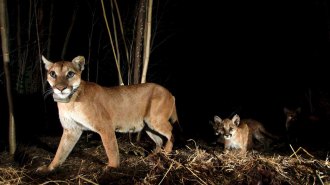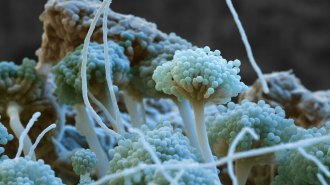News
-
 Climate
ClimateWind turbines could help capture carbon dioxide while providing power
Turbulent wakes from wind turbines can concentrate CO2 from cities and factories, making it easier to remove the greenhouse gas from the atmosphere.
-
 Animals
AnimalsMountain lions pushed out by wildfires take more risks
A study tracking mountain lions showed that after an intense burn, the big cats crossed roads more often, raising the risk of becoming roadkill.
-
 Astronomy
AstronomyMeet the BOAT, the brightest gamma-ray burst of all time
Probably triggered by a supernova in a remote galaxy, the burst detected on October 9 could challenge theories about these brilliant blasts.
-
 Psychology
PsychologyA new treatment for debilitating nightmares offers sweeter dreams
A new study combines standard nightmare disorder therapy with a memory-enhancing technique to create happier dreams and bring greater, lasting relief.
-
 Chemistry
ChemistryMixing gold ions into whiskey can reveal its flavor
By changing the spirit’s color, the formation of gold nanoparticles can reveal how much flavor a whiskey has absorbed from its wood cask.
By Nikk Ogasa -
 Earth
EarthParticles from space provide a new look inside cyclones
Cosmic rays that smash into the atmosphere make muons that are sensitive to changing air pressure inside storms.
-
 Climate
ClimateHere’s what happened to the Delaware-sized iceberg that broke off Antarctica
The powerful pull of currents in the Southern Ocean probably pulled apart the largest remnant of a massive iceberg that split off Antarctica in 2017.
-
 Earth
EarthLandslides shaped a hidden landscape within Yellowstone
Scientists have used lasers to get a detailed view of the national park’s topography, and they’ve spotted more than a thousand landslides.
-
 Physics
PhysicsProtons may be stretchier than physics predicts
Studying how quarks inside protons move in response to electric fields shows that protons seem to stretch more than theory says they should.
-
 Astronomy
AstronomyMost stars may have much more time to form planets than previously thought
Planet-making disks may survive around most young stars for 5 million to 10 million years — more than double a previous estimate.
By Ken Croswell -
 Health & Medicine
Health & MedicineA study questioning colonoscopy screening’s benefits has big caveats
The study included a lot of people who were invited to get the procedure but didn’t. That’s one limitation of several.
-
 Microbes
MicrobesHow fungi make potent toxins that can contaminate food
Genetically engineering Aspergillus fungi to delete certain proteins stops the production of mycotoxins that can be dangerous to human health.